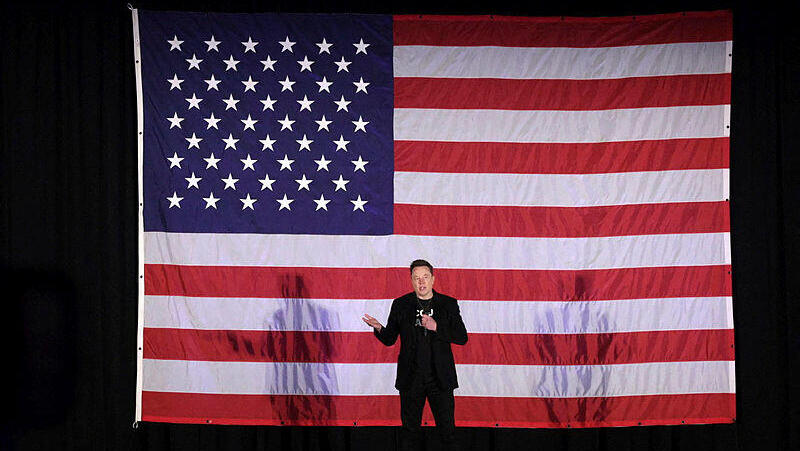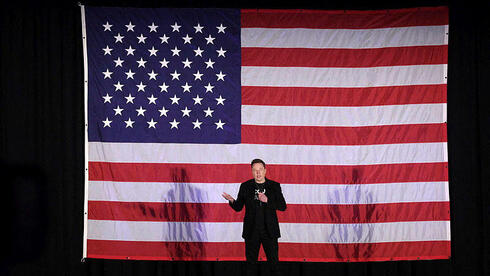
Rocking the vote: How Musk is trying to turn the election
With the help of tens of millions of dollars and advanced targeting technology, Elon Musk gives conflicting messages to various voters in the key states - with one goal: to hinder Kamala Harris and ensure Trump's victory.
The two ads look like a mirror image of each other. In the first, a distorted color image of the Democratic candidate for the US presidency Kamala Harris laughing against the background of the Israeli flag with the inscription "Kamala Harris supports Israel". In the second, a distorted black and white image of Harris laughing, this time against the background of the Palestinian Authority flag with the inscription "The two-faced Kamala Harris supports Palestine, not our ally Israel", with a red line crossing the word Israel. The first ad was targeted at Snapchat users who live in areas of Michigan with a high percentage of Muslim or Arab voters. The second, to areas of Pennsylvania with a high percentage of Jewish voters. And what do the two advertisements have in common? Behind them both is the billionaire Elon Musk, the richest man in the world and the owner of X, who mobilized all his resources to ensure the victory of Donald Trump in the election, and does not hesitate to spread lies and damage the foundations of American democracy for this purpose.
In the past, Musk was identified with the left side of the political map, mainly against the background of the establishment of Tesla and his stated ambition in the previous decade to contribute to the solution of the climate crisis - a position that placed him in a position opposite to the fossil fuel companies. However, over the past few years, Musk has moved to the right of the political map, partly as a result of adopting libertarian views that characterize many of the big multi-billionaires (since they support a zero tax burden) and are identified with the right of the political map. Since completing the acquisition of Twitter about two years ago, Musk has fully embraced the positions of the extreme right and has become especially close to Trump, whose candidacy he announced at the end of 2022.
Musk was not satisfied with moral support and moves such as the return of Trump's X account to activity, after it was blocked under the previous leadership of Twitter following its use to promote the coup attempt on January 6, and the distribution of pro-Trump messages and fake news from his very popular account (202 million followers).
At the same time, Musk established a Super PAC, an independent body that can support a political candidate and is not limited in the amount of funds it raises, called America PAC. In recent months, Musk and other billionaires have poured tens of millions of dollars into the PAC, with Musk alone contributing $75 million, creating a large-budget body that works to promote Trump's candidacy using unsupervised donations. Yesterday, by the way, Musk said that he will raffle off a million dollars every day until the election date among the signatories of an online petition published by America PAC and which expresses support, among other things, for the right to bear arms.
Harris's dual ads are the result of another, more secretive effort by Musk. According to reports by the Wall Street Journal, the New York Times, and the Huffington Post, behind the ads is a Trump-supporting super PAC called Future Coalition PAC. One of the main sources of donations for the PAC is a group called Citizens for Sanity, and according to reports, Musk transferred tens of millions of dollars to this group (which also channeled funds to a super PAC called Duty to America PAC). The exact amount of funds is difficult to estimate, since these are routed through a large number of political bodies and associations, when the source of the donation is not always revealed.
The relative secrecy of the funds, the multitude of entities that operate in the field, the lack of broad information about their operators, and the official disconnection between them and the presidential campaign itself (according to the law, a PAC is not allowed to coordinate moves with the campaign) allow them to take moves that may be legal, but certainly not ethical, without bearing any consequences.
And Harris' contrasting ads in Michigan and Pennsylvania aren't the only case. John Scott-Railton, a senior researcher at the Citizen Lab at the University of Toronto, identified a series of other cases where the Future Coalition PAC produced duplicate messages to different voters. This, through a Google tool that displays relevant information about advertisements shown to users in search results, on YouTube and the company's advertising network by advertiser.
Thus, for example, a video that simulates the visibility of an official advertisement on behalf of the Harris campaign, and targets users in areas of Michigan with a large Muslim or Arab population) proclaims that Harris has "a pro-Israel team you can trust." Another video, targeted at the same areas, portrayed Harris as "combating rising anti-Semitism." At the same time, users in areas with a large Jewish population in Pennsylvania were targeted with a video asking "Why suck up to Palestine?", and another asking "Why does Harris sympathize with anti-Semitic protesters?".
In another case, another body called Building America's Future, which received donations from Musk and other billionaires in the amount of 100 million dollars, established a straw body called Progress 2028, which pretends to be a progressive left movement. Under this name, the organization created a series of advertisements that spread false messages about Harris' positions on issues such as the right to bear arms, immigration, and rights for LGBT people, under the false appearance of an organization that supposedly promotes the candidate but actually works to harm her. This campaign is targeted at Facebook users in Virginia - a state with a large conservative population that, unusually, supported the Biden candidacy in the previous election.
Related articles:
Because of the distorted structure of the US presidential elections, the winner is not necessarily the candidate who wins the most votes (in 2000 and 2016, George Bush and Trump won the electoral college, respectively, although their opponents Al Gore and Hillary Clinton won more votes), but the one who wins the greater number of electors. The electors are appointed according to the results of the vote in each state, where the distribution is done according to the "winner takes all" method. That is, even if a candidate defeats his opponent by even one vote, he will receive all the state's electors.
Because of the deep political division in the US, in most states there is no real competition regarding the identity of the candidate who will win them. Harris is expected to easily win the electors of liberal states such as New York and California, while Trump will sweep conservative states such as Florida and Kentucky. The elections are decided, in the end, In some key states (Battleground States), when seven such states have been marked in the current election cycle, Pennsylvania, Michigan, and Georgia are among the central ones, and together they will provide about 50 of the 270 electors needed for victory.
In 2020, the results in these three states were decided by a difference of several tens of thousands of votes. In Georgia itself, the difference was only 11,779 votes in favor of Joe Biden. Therefore, any shift of voters, even if symbolic, can be of decisive importance in the final result. The 2024 elections will not be decided at the national level, maybe not even at the state level. At the end of the day, it may be the distribution of votes in several voting districts that will decide who will occupy the White House.
Musk understands this well, and does not hesitate to use the powerful infrastructure created by social platforms to reach voters in these districts. The ability to target users on a highly segmented basis is one of the points of pride of companies such as Meta, Google, Snap and TikTok. This is their main point of attraction for advertisers: you will reach exactly the target audience you want. Looking for users from Wyoming who are interested in skateboarding and like to drink coffee at lunch? We’ve got them? Do you want accountants who are diving enthusiasts from Sydney? You can find them with us.
This ability has also been used in the past to influence election campaigns. In particular, in 2016 by the Trump campaign that embraced Facebook's super-targeting capability while the Clinton campaign settled for broad and uniform messages, to a well-known result. Ideally, campaigns will use this ability to tailor authentic messages to their target audience, highlighting the parts of the candidate's platform or identity that are relevant to different voters. For example, Harris could target ads highlighting her support for abortion rights to women in states that have undermined that right in the past two years. Trump can promote his support for rebuilding the US manufacturing base in areas that once prospered due to the activity of large factories, but are in retreat amid the shift of production to China and other countries.
But under the entities funded by Musk, this ability takes a dark and disturbing turn. One that does not focus on positive construction of the candidate he supports, but on creating a false smear campaign of the rival candidate. False smear campaigns are also of course not a new invention. But under the auspices of targeting abilities, Musk can paint contrasting pictures of Harris in order to create reluctance towards her among two possible audiences of support who themselves hold opposing views. And to do so under a veil of secrecy that hides his involvement, and would have hidden the very existence of the campaign without the digging and exposure of various journalists and researchers. And even this exposure, there is no certainty that it will reach those voters that Musk is targeting.
The election is now in its final lap. By all indications, this will be one of the tightest races in US history. One where every vote (in a key state) counts. The various ads may not reach a large audience (most of them only get hundreds of thousands of views), and may not convince many voters to change their vote. But even if they get a few thousand to do so, or maybe even just stay home on November 5th, they will achieve their goal.
With two weeks to go until the elections, equipped with a treasure chest of tens of millions of dollars, the entities financed by Musk are going to flood the web with these types of campaigns. A large number, apparently, will only be exposed to their target audience after the polls close.
